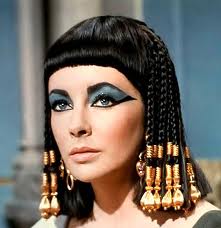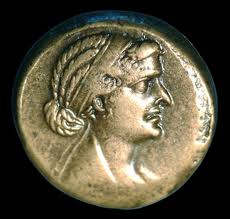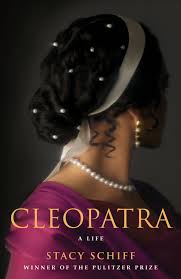My senior seminar is on the subject of biographies; all semester, we’ve been reading a different biography each week (3,294 pages worth of biographies, to be more precise). The last biography we had to read was Stacy Schiff’s Cleopatra: A Life. Apart from seeing bits and pieces of the movie-version with Elizabeth Taylor, my conceptions of Cleopatra were pretty limited to the few times we talked about her in Latin classes in high school. Like a lot of people, I thought of Cleopatra as the ultimate coy minx/seductress who was using her sexuality for power. (Also, like, sort of a diva if you consider the way she died.)
When I began Cleopatra I assumed that Schiff’s biography would offer a slightly different view of Cleopatra, but what surprised me the most was that there is very little concrete evidence about Cleopatra’s actual life; we’re limited to some hieroglyphics and portraits of her on coins (and the reality of these coins is that Cleopatra wasn’t beautiful at all). In her biography, Schiff sets out to dispel the myth and (according to her) false conceptions of Cleopatra. The root of the problem of Cleopatra’s myth is that accounts of Cleopatra were written by classical writers (like Plutarch and Dio) decades and centuries after her death. More than that, these guys had good reason to skew perceptions of Cleopatra as a wanton temptress, mostly so they could blame the downfall of two ultra-powerful Romans (Caesar and Marc Antony) on Cleopatra.
Schiff offers an entirely new perspective of Cleopatra (a feministy perspective), pitting historical research and fact against the inflated classical accounts of Cleopatra. Though Schiff’s biography is formed entirely on conjectural statements, it’s nonetheless convincing. Schiff crafts a figure of Cleopatra who is highly educated, calculating, an expert political strategist and an ingenious negotiator. Schiff contextualizes Alexandria at the time of Cleopatra’s reign, asserting that women in Alexandria had all kind of forward-thinking rights that Roman women didn’t share, making her argument much more convincing. Schiff’s Cleopatra is motivated almost entirely by preserving her power and control over Egypt (and even strategically becomes pregnant by Caesar so that she has ties to Rome). Schiff cites Cleopatra’s apparent stellar charisma and magnetic aura as the reason for her ability to capture the affections of high-powered Romans. We also learn a lot more about what Cleopatra was up to politically (not just her sexual conquests) – including momentary exile and a civil war with her thirteen-year-old brother/husband.
However, after doing outside research for a presentation on Schiff’s biography, I found that depictions of Cleopatra have evolved throughout time depending on what was going on culturally. If this is the case, is Schiff creating a feminist version of Cleopatra because this is what the present-day demands? Because we know so little about Cleopatra’s life, it’s difficult to say. Either way, it’s refreshing to have a brand new take on a figure that has been so bounded up in myth.



While reading this article it reminded me of the conspiracy theory that Shakespeare may not have been the famous play writer we all believe him to be. Instead their are strong theories out there that suggest he was just a front man for the play writer known as Christopher Marlowe. In fact if you google image pictures of both of these play writers you’ll see how this theory can be so strong. The point I’m making is when it comes to history we can not truly know everything. A lot of things in the past can easily be left to speculation such as in Cleopatra’s case. However, its still interesting to think about if everything we know about her is just a hoax given her notorious status in history. It is kind of like the mystery behind the formation of stonehenge, i guess we will never know.
This post is so informative! I would have never known all that you shared about the “true” Cleopatra. It’s interesting how, in the contemporary moment, we have developed this misinformed idea of who she was and even what she looked like! I think many, including myself, will be intrigued to learn more about her life and read other texts that combat the widely shared narrative of her life!